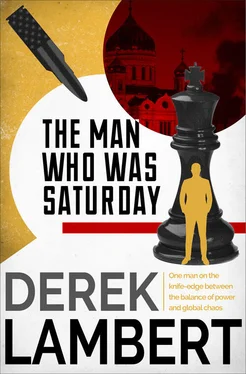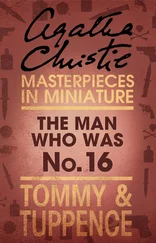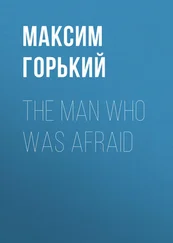The Man Who Was Saturday
DEREK LAMBERT
(with apologies to the memory of G.K. Chesterton whose man was Thursday)

COPYRIGHT
Collins Crime Club
An imprint of HarperCollins Publishers Ltd.
1 London Bridge Street
London SE1 9GF
www.harpercollins.co.uk
First published in Great Britain by Hamish Hamilton Ltd 1985
Copyright © Derek Lambert 1985
Design and illustration by Micaela Alcaino © HarperCollinsPublishers Ltd 2017
Cover photographs © Shutterstock.com
Derek Lambert asserts the moral right to be identified as the author of this work
A catalogue record for this book is available from the British Library
This novel is entirely a work of fiction. The names, characters and incidents portrayed in it are the work of the author’s imagination. Any resemblance to actual persons, living or dead, events or localities is entirely coincidental.
All rights reserved under International and Pan-American Copyright Conventions. By payment of the required fees, you have been granted the non-exclusive, non-transferable right to access and read the text of this ebook on screen. No part of this text may be reproduced, transmitted, down-loaded, decompiled, reverse engineered, or stored in or introduced into any information storage and retrieval system, in any form or by any means, whether electronic or mechanical, now known or hereinafter invented, without the express written permission of HarperCollins ebooks
HarperCollins Publishers has made every reasonable effort to ensure that any picture content and written content in this ebook has been included or removed in accordance with the contractual and technological constraints in operation at the time of publication
Source ISBN: 9780008268480
Ebook Edition © November 2017 ISBN: 9780008268473
Version: 2017-11-09
DEDICATION
To Roger and Lise.
EPIGRAPH
‘… for life is a kind of Chess, in which we have often points to gain, and competitors or adversaries to contend with, and in which there is a vast variety of good and evil events that are, in some degree, the effect of prudence, or the want of it …’
Benjamin Franklin
CONTENTS
Cover
Title Page
Copyright
Dedication
Epigraph
Opening
Chapter 1
Chapter 2
Chapter 3
Chapter 4
Chapter 5
Chapter 6
Chapter 7
Chapter 8
Chapter 9
Chapter 10
Chapter 11
Chapter 12
Chapter 13
Adjournment
Chapter 14
Middle Game
Chapter 15
Chapter 16
Chapter 17
Chapter 18
Chapter 19
Chapter 20
Chapter 21
Chapter 22
Adjournment
Chapter 23
End Game
Chapter 24
Chapter 25
Chapter 26
Chapter 27
Chapter 28
Chapter 29
Chapter 30
Keep Reading
About the Author
By the Same Author
About the Publisher
OPENING
CHAPTER 1
Kreiber peered into the black wound in the river ice and in the light of a kerosene flare saw the face of a young man peering up at him.
He wasn’t surprised because nothing surprised him when he had been nipping steadily at the vodka bottle, but he was intrigued, so intrigued that he scarcely heeded the footsteps behind him.
Probably another fisherman who had left his hole carved in the frozen curve of the River Moscow to pick his way through the darkness to cadge some bait.
The footsteps slithered, stopped.
Kreiber continued to stare at the reflection of the young man whose face occasionally shivered into rippled particles in the iced wind blowing in from Siberia.
A face from the past.
My face.
Kreiber, packaged against the cold with felt and newspaper and a fur hat with spaniel ears, took a long pull of Ahotnichaya , hunter’s vodka, and smiled sadly, almost paternally, at the young warrior, armed to the teeth with ideals, that he had once been.
Twenty years ago a girl who had crossed the wall from East to West Berlin had espied those ideals and sunk sharp teeth into them. A refugee was what she had claimed to be; a recruitment officer seeking Western brains was what she had proved to be.
‘Look at the decadence around you,’ she had fumed to Kreiber, nuclear physicist, harnessing awesome powers to preserve peace. ‘Look at the capitalists, hedonists, wheeler-dealers and neo-Nazis. Do you think they give a pfennig for humanity?’
And so persuasive was her tongue, so compliant her magnificent body, that, reversing the trend, he had trotted from West to East of the divided city and thence to Moscow, losing the girl in transit, only to discover that in Russia there were those who didn’t give a kopek for humanity.
A long time ago. At forty-five he was now an old man in a still-alien city finding contemplative pleasure in long night-watches beside the black hole in the ice threaded with a line and tackle.
Taking another nip of firewater, he winked at the Kreiber he had once been. ‘Don’t worry,’ the wink said, ‘we’ll show them yet.’ He warmed mittened hands against his charcoal brazier and found strength from it.
The man in the long black coat stood directly behind Kreiber, eyes glittering in the holes in his grey wool mask.
A fish attracted by the kerosene flare tugged Kreiber’s line and the young face in the water disappeared in the commotion.
Kreiber pulled; the fish pulled. A fat lunch there judging by its strength, probably bigger than anything the other anglers hunched beside their flares and charcoal braziers had caught. Not that he would ever know: they didn’t discuss their catches with the foreigner who fished alone on the fringe of the ice-camp.
The fish gave a little. Kreiber slipped, kicking the brazier. A charcoal ember fell hissing on the ice. But his quarry was firmly hooked. Maria would cook the fish in butter and he would wash it down with a bottle of Georgian white.
An aircraft, red light winking, passed high over the fishermen engrossed beside their black troughs on the outskirts of Moscow. Kreiber wondered if it was flying to Berlin.
The man in the black coat pinioned Kreiber’s arms from behind, twisted one behind his back. He wasn’t excessively strong but Kreiber was vodka weak. Kreiber began a scream but it was cut out by a sweet-smelling rag pressed hard against his mouth.
He kicked backwards, lurched forward, pain burning his trapped arm. He let go of the line and thought ludicrously: ‘The one that got away.’
He was propelled, feet slipping, the last few centimetres to the edge of the neat round abyss that he had cut that evening. Beside him the line ran out as the fish dived.
A dreamy fatalism overtook him. The other anglers, he supposed, were too far away or too deep in their reveries to notice anything untoward. In any case you don’t tangle with a foreigner’s problems.
How about a last slug of Ahotnichaya to dispatch him glowing from this life? With his free hand he tore away the hand from his mouth but his plea for a last nip was a rubbery mumble.
Cold ran up his legs. His feet splashed. He was paddling in a lake in the Grunewald in West Berlin. Pressure on his shoulders, down, down.
He inhaled water as, with the girl at his side, he crossed the border from Capitalism to Communism never to return.
Bitch!
He began to fight, thrashing the black water with his legs, clawing at the terrible pressure above, but dragged inexorably down the ice-tube by water-logged newspaper and felt.
He managed to grasp the edge of the ice. Crack. He heard the bones in his fingers snap as heavy boots stamped on them. Crack. Still he held on, not feeling pain anymore, just the cold of the grave.
Читать дальше













